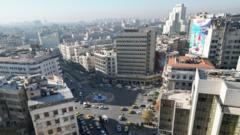For the first time in over a decade, residents of rebel-held areas in Syria awaken to quiet skies, heralding an end to the terror of government airstrikes, giving rise to hope and newfound safety among the population.**
Silence in the Skies: A New Dawn for Syria's Rebel Areas**

Silence in the Skies: A New Dawn for Syria's Rebel Areas**
In a groundbreaking development, rebel-held regions in Syria experience a profound shift, as the fear of airstrikes from Syrian and Russian planes dissipates, marking a potential turning point in the civil war.**
In a historic shift for Syria's conflict, inhabitants of rebel-held regions have this week awoken to an unprecedented silence above them, signaling a significant reduction in Syrian government and Russian airstrikes that have terrorized these communities for many years. The absence of the ominous sounds of warplanes marks an important moment in the ongoing civil war, allowing citizens to gather openly and express relief and joy without the looming threat of imminent attack.
Syrians living in districts remnant of intense fighting are experiencing a newfound sense of security. As members of the White Helmets, a volunteer rescue group that tirelessly operated amidst chaos, witness the change, they reflect on the relentless fears of the past. Hamid Qutaneh, a prominent member associated with the group, expressed the joy and hope that has emerged from this transition. He recounts a lifetime marked by airstrikes since childhood, noting that, for the first time, individuals are now free to congregate without the paranoia of sky attacks. “What happened is the beginning of the road to justice,” he asserted, as they collectively welcomed the dawning era of peace.
Ramez Abu Farhan, a local from Homs, echoed similar sentiments upon returning from a celebratory gathering. He described the profound happiness felt by individuals who no longer fear bombardments. "There is safety; there aren’t airstrikes; there are no planes," he reiterated, emphasizing the profound impact of this tranquility on the aspirations of the community.
The history of aerial bombardments in Syria, particularly in rebel-held areas, is grim. The Syrian Network for Human Rights reports that over 100,000 lives have been lost due to airstrikes, which have served as a key strategy for President Bashar al-Assad’s regime in maintaining control over the nation. As this chapter closes with the apparent cessation of airstrikes, the citizens dream of a brighter and safer future, one where they can live without the shadow of violence looming over them.
The implications of this shift are yet to be fully understood, but for now, the people of these regions are embracing this long-awaited respite, which could signify a turning point in their arduous journey toward reclaiming normalcy.
Syrians living in districts remnant of intense fighting are experiencing a newfound sense of security. As members of the White Helmets, a volunteer rescue group that tirelessly operated amidst chaos, witness the change, they reflect on the relentless fears of the past. Hamid Qutaneh, a prominent member associated with the group, expressed the joy and hope that has emerged from this transition. He recounts a lifetime marked by airstrikes since childhood, noting that, for the first time, individuals are now free to congregate without the paranoia of sky attacks. “What happened is the beginning of the road to justice,” he asserted, as they collectively welcomed the dawning era of peace.
Ramez Abu Farhan, a local from Homs, echoed similar sentiments upon returning from a celebratory gathering. He described the profound happiness felt by individuals who no longer fear bombardments. "There is safety; there aren’t airstrikes; there are no planes," he reiterated, emphasizing the profound impact of this tranquility on the aspirations of the community.
The history of aerial bombardments in Syria, particularly in rebel-held areas, is grim. The Syrian Network for Human Rights reports that over 100,000 lives have been lost due to airstrikes, which have served as a key strategy for President Bashar al-Assad’s regime in maintaining control over the nation. As this chapter closes with the apparent cessation of airstrikes, the citizens dream of a brighter and safer future, one where they can live without the shadow of violence looming over them.
The implications of this shift are yet to be fully understood, but for now, the people of these regions are embracing this long-awaited respite, which could signify a turning point in their arduous journey toward reclaiming normalcy.





















